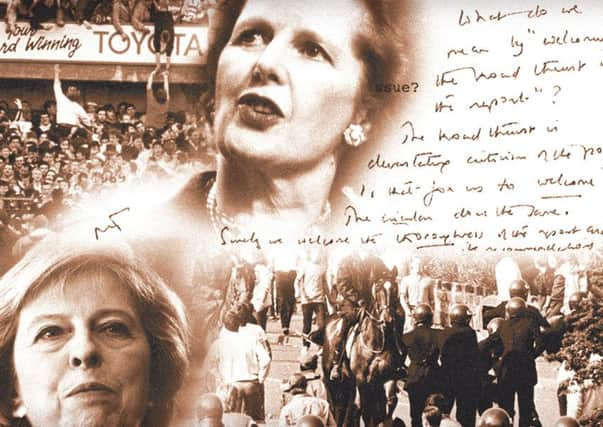Tom Richmond: The Thatcher years. Time for truth over Hillsborough and Orgreave


This appears so. Judging by the then PM’s handwritten comments on this memo – sent to her on the eve of publication of Lord Justice Taylor’s interim report into the disaster at the 1989 FA Cup semi-final – Mrs Thatcher retained a blind faith in the force despite overwhelming evidence to the contrary.
Typed on August 2, 1989, by Caroline Slocock, Mrs Thatcher’s private secretary, it forewarned the then PM about the “strength” of the criticisms being made against the police.
Advertisement
Hide AdAdvertisement
Hide AdHowever it is Mrs Thatcher’s personal asides which are most revealing about her attitude. “What do you mean by welcoming ‘the broad thrust of the report?” she wrote.
“The broad thrust is devastating criticism of the police. Is that for us to welcome? The circular does the same. Surely we welcome the thoroughness of the report and its recommendations?” These notes, written in fountain pen, were signed ‘MT’.
This document is not new. The context, however, is new because it needs to be seen in the light of The Yorkshire Post’s exclusive revelations that the same senior officers responsible for investigating Orgreave, a scandal which resulted in the prosecution case against pickets collapsing because of irregularities in the police evidence, were in charge of the force’s response to Hillsborough.
The background is this. The Slocock memo was one of thousands presented to the Hillsborough Independent Panel inquiry, presided over by James Jones, the former Bishop of Liverpool. It effectively vindicated the original Taylor report and paved the way for new inquests which concluded last month that the 96 Liverpool fans had, in fact, been unlawfully killed.
Advertisement
Hide AdAdvertisement
Hide AdThe country’s gravest miscarriage of justice, many now concur that the families and friends of these football fans – men, women, boys and girls crushed to death because of police operational failures – could have been spared 27 years of heartache and anguish if the dogmatic Thatcher government had not insisted that inebriated supporters were to blame.
In Home Secretary Douglas Hurd’s own “confidential” note to Mrs Thatcher on August 2, 1989, he said Taylor concluded that “the main reason for the disaster was the failure of police control”. He could not have been clearer. He added: “The actions of individual senior officers, especially Chief Superintendent Duckenfield, are criticised; reference is made to poor operational orders, lack of leadership and evidence of senior officers given to the inquiry is described as defensive and evasive.
“It would be for the Chief Constable, and perhaps the Director of Public Prosecutions and the Police Complaints Authority, to act on the conduct of individual officers.”
Why did Mrs Thatcher not listen – and why did Mr Hurd not resign on principle when told to soften his stance? Just think of the heartache that it would have saved.
Advertisement
Hide AdAdvertisement
Hide AdComing weeks after this newspaper revealed correspondence showing how Mrs Thatcher had personally intervened over the policing of Orgreave, this political micro-management of the South Yorkshire force again raises the question whether the police believed – erroneously – that they could circumvent the law because of the challenges they faced during the year-long Miners’ Strike.
Given this, it is even more imperative that all documents regarding the Orgreave and Hillsborough cover-ups, together with the correspondence of ministers and transcripts of telephone conversations, is placed in the public domain to ascertain the culpability of those police chiefs and politicians concerned.
Until this happen, South Yorkshire Police will not be able to regain the broken trust. As Home Secretary Theresa May told the Police Federation this week: “We must never underestimate how the poison of decades-old misdeeds seeps down through the years and is just as toxic today as it was then. That’s why difficult truths, however unpalatable they may be, must be confronted head on.”
A Home Secretary of stature and integrity, Mrs May must now apply this principle to Orgreave. The public interest now demands nothing less.
Advertisement
Hide AdAdvertisement
Hide AdLEEDS Council chief executive Tom Riordan and his senior team find themselves in the spotlight after the transport policy for their city was left in tatters when their trolleybus plan was given the red light by a Government planning inspector.
It still defies belief that this council – always one of the first to plead poverty – spent £72m of public money on preparing a scheme which would not have advanced public transport and possibly made congestion worse. Where was the management oversight?
Long-suffering Leeds commuters and taxpayers have the right to know the names of those responsible for this fiasco so their future performance can be tracked – council executives should not be exempt from scrutiny. MP Greg Mulholland’s call for a transport summit must also be heeded so a consensus can be reached.
The seriousness of the situation can be explained like this. Leeds is on the brink of being recognised as one of Europe’s most desirable cities to live and work and it would be churlish not to acknowledge Mr Riordan’s role in the area’s resurgence.
Advertisement
Hide AdAdvertisement
Hide AdThe caveat is this. Unless he does the right thing and rids his authority of the incompetent proponents of trolleybus, and the equally flawed Leeds to Bradford ‘cycle superhighway’ which is an accident waiting to happen, people will lose trust and it will be his position on the line.